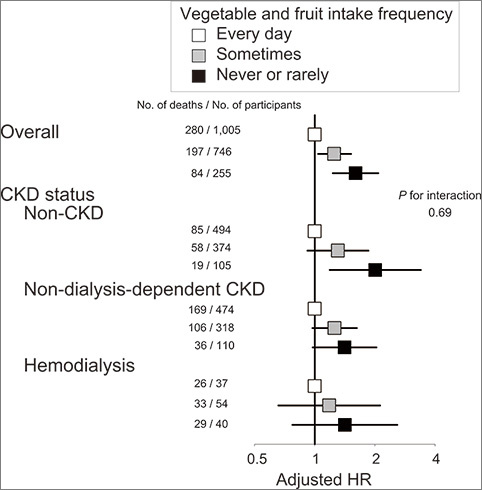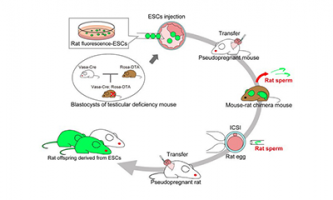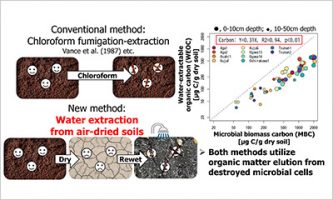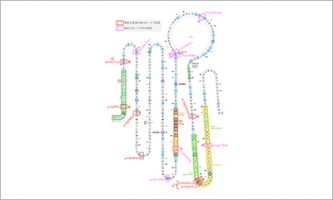Lower frequency of vegetable and fruit intake linked to higher risk of death regardless of chronic kidney disease (CKD) status
Feb 24 2023
A new study of Japanese patients with and without CKD found that a lower frequency of vegetable and fruit intake was associated with a higher risk of death regardless of CKD status. Baseline serum potassium levels stratified by CKD stages were similar across the groups (according to the frequency of vegetable and fruit intake). The findings suggest that eating vegetables and fruits every day may not be associated with an increased level of serum potassium and that it may reduce rather than increase all-cause mortality in patients with CKD including those on HD, as has been observed for non-CKD individuals.
A higher fruit and vegetable intake is associated with a lower mortality risk in the general population. In contrast, patients with advanced CKD, especially those on HD, are generally discouraged from consuming high amounts of vegetables and fruits given the potential risk of hyperkalemia. Recent studies conducted in non-Asian countries suggest that a higher vegetable and fruit intake may be associated with lower mortality among adults with CKD, including those patients on HD and those who are not.
"We need to examine the association between vegetable and fruit intake and the risk of death in Japanese patients with CKD," said Dr. Wakasugi, the corresponding author of the study. "The vegetable and fruit intake vary markedly across countries. Diets consumed by Asian populations are estimated to be higher in vegetables and fruits relative to diets consumed by other populations."
Using data from a registry of the only major hospital on Sado Island, Japan, the study examined the association between the frequency of vegetable and fruit intake and all-cause mortality in non-CKD and CKD populations, and to determine if this association is modified by CKD. The frequency of vegetable and fruit intake was determined by a self-reported questionnaire using an ordinal scale, "never or rarely," "sometimes," and "every day."
Of the 2,006 patients who completed the self-reported questionnaire, 45% (n = 902) were patients with non-dialysis-dependent CKD and 7% (n = 131) were patients on HD. The frequency of vegetable and fruit intake decreased with worsening CKD stage. The baseline level of serum potassium stratified by CKD stages was similar across all three groups.
During a median follow-up of 5.7 years, 561 deaths were observed. Compared with participants who ate vegetables and fruits every day, those who ate these sometimes and those who never or rarely consumed vegetables and fruits had 25% and 60% higher risk of dying from any cause, respectively. When stratified by CKD status, a similar, albeit non-significant, dose-dependent relationship was observed between the frequency of vegetable and fruit intake and all-cause mortality irrespective of CKD status, suggesting no CKD effect modification (Pinteraction = 0.69).
"Our results suggest that the associations reported in previous studies from non-Asian countries are also observed in Asian populations," said Dr. Wakasugi. "Our findings support that, although food culture differs by country, the survival benefit of a high vegetable and fruit intake may be universal."

Publication Details
Journal: Journal of Renal Nutrition
Title: Vegetable and fruit intake frequency and mortality in patients with and without CKD: A hospital-based cohort study
Authors: Minako Wakasugi, Akio Yokoseki, Masakazu Wada, Takeshi Momotsu, Kenji Sato, Hiroyuki Kawashima, Kazutoshi Nakamura, Osamu Onodera, Ichiei Narita
doi: 10.1053/j.jrn.2023.01.011
News release
The article was released in EurekAlert, the online publication of the American Association for the Advancement of Science.
More News
-
 Jul 07 2025 Research results
Jul 07 2025 Research resultsFertilizable rat sperm produced in a mouse body by blastocyst complementation
-
 Jun 26 2025 Research results
Jun 26 2025 Research resultsEstimating Microbial Biomass from Air-Dried Soils: A Safer, Scalable Approach ーRevolutionary Technique Estimates Soil Microbial Biomass Using Water-Extractable Organic Matterー
-
 Jun 03 2025 Research results
Jun 03 2025 Research resultsAssociation of rare APOE missense variants with Alzheimer's disease in the Japanese population
